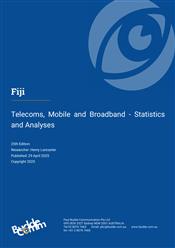Fiji Telecoms Market Report
Telecoms, Mobile and Broadband - Statistics and Analyses

Fiji’s Competition and Consumer Commission approves Telstra’s acquisition of Digicel
Fiji is the leading market to watch in terms of both LTE and 5G development in the region. The market boasts relatively sophisticated, advanced digital infrastructure, with telcos’ heavy investment resulting in the country having the highest mobile and internet penetration in the Pacific Islands region.
LTE, LTE-A, and fibre technologies have received the most investment by the Fijian mobile operators, which include Digicel Fiji, Vodafone Fiji, and Telecom Fiji. Notably, LTE now accounts for the largest share of connections in the mobile segment. Concentrating on the more highly populated areas, the operators are preparing for the next growth area of high-speed data. They also have 5G in mind, and are preparing their networks to be 5G-ready, anticipating an easier migration to the technology based on the relatively high LTE penetration rate. The sale of Digicel to Telstra also passed a major hurdle when the Fijian Competition and Consumer Commission approved the transaction in March 2022.
Fiji presents a challenging geographic environment for infrastructure development due to its population being spread across more than 100 islands. However, the majority of Fijians live on the two main islands of Viti Levu and Vanua Levu.
In July 2018, the two islands were linked by the Savusavu submarine cable system, which provides a more secure link in times of emergency weather events such as the regular tropical cyclones that often cause massive destruction to the area, including destroying essential infrastructure such as electricity and telecommunications equipment. Notably, the December 2021 eruption of the Hunga Tonga–Hunga Ha'apai submarine volcano in Tonga damaged the Tonga Cable which connects Fiji, and Tonga blocking the latter off from internet services. Cable theft and damage of critical communications infrastructure has also become a concern in Fiji, prompting authorities to establish a joint taskforce to tackle the issue.
In Fiji, the Covid-19 pandemic has devastated the economy that is otherwise reliant on the hospitality and tourism sectors. The country faced strict lockdowns and restrictions on cross-border travel due to the onset of the Delta variant in April 2021. Although the economy is in recovery, these sectors still face an even more challenging business environment.
On the consumer side, spending on telecoms services and devices is under pressure from the financial effect of large-scale job losses and the consequent restriction on disposable incomes. However, the crucial nature of telecom services, both for general communication as well as a tool for home-working, has offset such pressures. The market is thus expected to continue a positive growth trajectory through 2022.
Key developments:
- Australian government contributes $1.33 billion of the $1.6 billion cost for Telstra to acquire Digicel Pacific, while the Competition and Consumer Commission approves the transaction subject to conditions;
- SpaceX sets up a temporary ground station in Fiji to provide an internet gateway for Tonga;
- Authorities launch a joint task force to investigate the telecoms cable and metal theft;
- Fiji’s public health sector and economy devastated by the Delta variant of Covid-19;
- Vodafone partners with Aryaka Networks to use the latter’s SD-WAN solutions to service its enterprise clients, contracts Comms Group to supply wholesale telecom services;
- Vodafone partners with ANZ Bank for transfers with M-PAiSA wallets; m-money payments increase from around $100 million in 2016 to over $700 million in the first ten months of 2021;
- Fiji government announces a 30-year tax holiday and duty concessions for any company wishing to invest more than FJD$40 million in submarine networks and associated infrastructure development;
- TFL announces a five-year plan to expand fibre infrastructure to more parts of the country; nearly completes its LTE network expansion for the Suva-Nausori corridor and parts of city of Lautoka;
- The Gondwana-2 international submarine cable to Fiji to be lit later in 2022;
- Digicel launches an Internet Payment Gateway (IPG) service in partnership with BSP.
- Government allocates $4.7 million to the DigitalFiji project to accelerate the digitisation of public services;
- Report update includes the regulator’s market data to December 2021, telcos' financial and operating data for 2021, recent market developments.
Companies covered in this report include:
Amalgamated Telecom Holdings (ATH), Telecom Fiji (TFL), Fiji International Telecommunications (FINTEL), Kacific Broadband Satellites, Southern Cross Cable Network (SCCN), Vodafone Fiji (VFL), Digicel Fiji, Inkk Mobile, Unwired Fiji, Fintel Internet Services (Kidanet).
Related Reports
- South Pacific Islands - Telecoms, Mobile and Broadband - Statistics and Analyses
- Papua New Guinea - Telecoms, Mobile and Broadband - Statistics and Analyses
- Samoa - Telecoms, Mobile and Broadband - Statistics and Analyses
- Vanuatu - Telecoms, Mobile and Broadband - Statistics and Analyses
- Solomon Islands - Telecoms, Mobile and Broadband - Statistics and Analyses
- French Polynesia - Telecoms, Mobile and Broadband - Statistics and Analyses
- Australia - Telecoms, Mobile and Broadband - Statistics and Analyses
- New Zealand - Telecoms, Mobile and Broadband - Statistics and Analyses
Share this Report
TMT Intelligence
A platform to scale your intelligence tasks
Monitor critical insights with our AI-powered Market Intelligence Platform gathering and analyzing intelligence in real time. With AI trained to spot emerging trends and detect new strategic opportunities, our clients use TMT Intelligence to accelerate their growth.
If you want to know more about it, please see:
Research Methodology
BuddeComm's strategic business reports contain a combination of both primary and secondary research statistics, analyses written by our senior analysts supported by a network of experts, industry contacts and researchers from around the world as well as our own scenario forecasts.
For more details, please see:
More than 4,000 customers from 140 countries utilise BuddeComm Research
Are you interested in BuddeComm's Custom Research Service?
Hot Topics
News & Views
Have the latest telecommunications industry news delivered to your inbox by subscribing to BuddeComm's weekly newsletter.